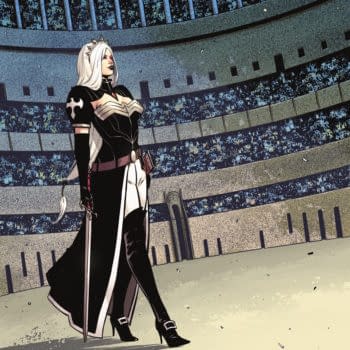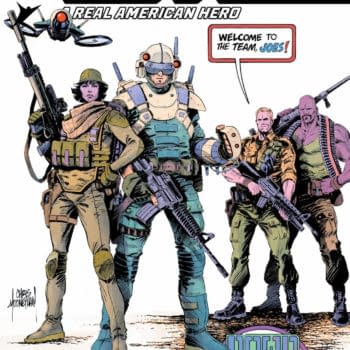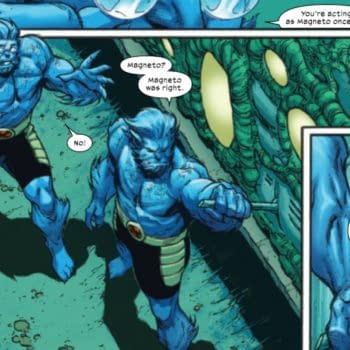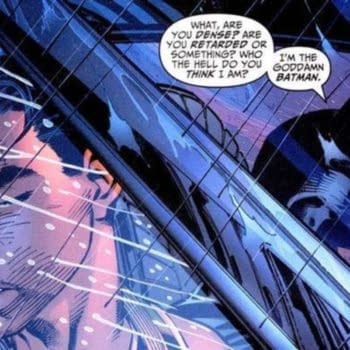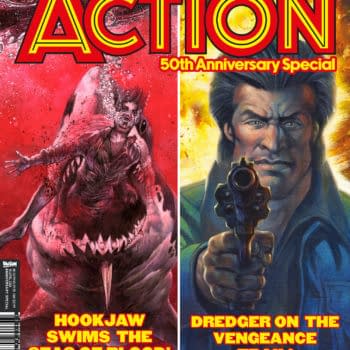Posted in: Comics | Tagged: Comics, entertainment, howard chaykin, marvel, star wars
"Star Wars Poisoned My Career" – Howard Chaykin Speaks Out

By Olly MacNamee
Ahead of his storming, expletive laced appearance at this year's San Diego Comic Con, Howard Chaykin attended a much smaller, but intimate, affair right here in the beautiful countryside of Great Britain, attending the inaugural Shrewsbury International Comic Art Festival where Iw as able to catch a few minutes with the man that, in person, is one part PT Barnum, and another part a walking, talking living legend of the comic book world. Not something, however, he believes himself. Talking about those heady times in the 70's, when he was sharing studio space with Walter Simonson and Frank Miller, as well as his love for the art of Gil Kane and his own place in the industry today, off stage Chaykin was frank, open and honest in his opinions of the comic industry of yesteryear and of today.
Olly MacNamee: You have waxed lyrical about your admiration for Gil Kane in the past, and over this weekend's event too. What is his legacy do you think, when stacked up against Kirby, for instance?
Howard Chaykin: Interesting question. For me coming up in New York as a youngster, I just wasn't aware of Jack's work. The guys that I was aware of was the Julie Schwartz edited stuff at DC, the Silver Age of comics when I was 12 or so; Kubert's Hawkman, Infantino's Flash, Gil's Green Lantern, those kinda guys. Those were the guys to follow, and I was a Gil Kane fan. I met him when I was 13, by accident, at a bookstore and I was just struck dumb by him. He was an imposing man and involved with the comics I loved. Years later, I went to work for him and he was a straight speaking guy; not an easy guy at times, I can tell you. There was a load of contradictions going on inside him. He was an honest man, but a haunted man too. His legacy? His choreography of the human body on the page, the sheer elegance of his figure drawings. In some ways his trajectory as an artist was similar to mine; he started off awful – Hell, I was worse, much worse – but the improvements he made, through study, was deeply profound to me. A lot of this, I feel, Kirby lost when he went from being an artist of action to an artist of impact. Kane maintained the former; a sense of fluid choreography and that tradition. I think what you've got today is a swathe of artist working in comics who are deeply influenced by Gil Kanewhether they know it or not and usually they don't. He's become something of a forgotten man.

HC: My generation certainly felt as though we were standing on the shoulders of giants, but the desire for historicity is something that has gone away. The guys that followed me, in the later 70's, seemed to regard themselves of having transcended their influences, creating a new dynamic in comics. I think there is a fear that if you acknowledge your influences, where you've come from, you diminish your own worth as an artist. It's a false fear and can represent some kind of narcissism that is personally off-putting to me. I've always said that, when I go, I'll get two weeks of good ink then they'll be pissing on my grave. Nowadays, that's more likely to be one week and then, 'Howard? Howard who?' Of course, the comic book community seems to be getting smaller and smaller every day. I've spent years and years trying to tell the readers that it's the talent that's the brand, not the product, as the companies would want you to believe. It's a battle I think I've lost.
OM: You surprised me when you revealed that you are one of the least reprinted creators out there. I mean, just your work at DC in the late eighties, Twilight, Blackhawks…
HC: Yep. You've got to remember these are extremely important characters from my own boyhood, but look how long it took them to do a trade paperback of Twilight, and there's never been a TPB of Blackhawks. I embarrass these people. I think John Byrne, who's entitled to his own opinions (and he really is; he's been around long enough to be able to say these things), felt at the time I had raped these sci-fi heroes. And, I would rather take his opinion of value than from someone who knows nothing. We are surrounded by people nowadays who are deeply uninformed. As such, I seem to have had a ghost career in some ways. For the most part, the enthusiasts don't know who the Hell I am.
OM: But for me, and my generation, you will be remembered. And not just for Star Wars, but for your work on American Flagg!
HC: That may be. But, I can tell you now that 90% of the comic enthusiast out there today will only remember me for Star Wars, which had poisoned my career. Star Wars has sold countless millions and millions of copies and reprints over the years, while Flagg hasn't; not by a long-shot. I'm not the sort of guy that does the work that comic book fans necessarily respond to, I'm just not and I understand that. Basically because when I started my career I wasn't that good. By the time I was good, I just didn't want to create the sort of work that would generate the sort of commercial portfolio that would be good for me. I just wasn't interested. I had to find other avenues for my skill set, which I did, but at the time I wasn't aware that I would be locking myself out of the mainstream. I always thought I had a mainstream head on my shoulders. I realise now, in retrospect, that my audience's interests and mine don't necessarily cross over that often. Which is weird, as I grew up obsessed with mainstream comics. I've even got a photograph of myself at 17, at my drawing board, 260 lbs of fat fanboy. I'm the guy that read Marvel and DC Comics religiously, I was a Golden Age collector when I was a kid and I just loved mainstream comics. Maybe I should have ended up with Daniel Clowes and Art Spiegleman, but the reality of it was that I liked the superhero genre and not the more narcissism that is called for in more autobiographical work.

HC: They were the best! Being in your 20's, and in the 70's in New York, it's like a canister of oil and a match. I loved it. I'd gone from being an non-entity as a kid to becoming a confident, well dressed man living in Manhattan. I was up all night and never saw daylight for four years. It was amazing! Nowadays, I live completely out of the mainstream. I like in a small town in California, and I have no idea how modern day creators work, or play. When I do get together with other artists, we don't talk shop. I talk to (Matt) Fraction (who he worked with on Satellite Sam) every now and again, but I don't live that life anymore. When I lived in New York, I lived with other creators and socialised with guys in the business. But, when I moved to California and into television, that went away. The guys I see daily now are retired school teachers, retired prop makers, retired agricultural workers. I have breakfast every morning with a bunch of guys, with me being one of the youngest. We're up early every morning – it's an agricultural town – and as such, my social life is very far removed from my professional life these days.
OM: You're here at a very British comic festival, with John Wagner (2000AD). With your irreverent take on things, why have you never done a Judge Dredd strip?
HC: No-one's ever asked me. I was on the original Judge Dredd film briefly, and to this day I still have no idea why I was on it, or why I was fired.
OM: I think you'd be the perfect fit. Who knows, maybe someone at 2000AD is reading this interview.
HC: Ha! I doubt it, though. I'd love to do a Bo Jeffries strip, but that would mean working form one of Alan (Moore's) scripts, which would be a saga in itself. But, overall, I'm not much of a science fiction fan these days. A lot of that had to do with Archie Goodwin, who drew me into hard boiled crime fiction. I'm an observer of reality, and crime fiction is good at this. But, hey, I know I'm one of the luckiest guys out there, making a living for the past 40 years out of my hobby. Shrewsbury this week, San Diego next week. I feel I'll be jet lagged until Christmas at this rate.
And with this, his last spot of a long three day weekend, Howard set off to his hotel. And, I for one cannot help but feel lucky, having been able to see the man in action and on such a small scale, when compared to the crowds at SDCC. And, unlike his on-stage persona, the real Chaykin is less brash, less bold, less prone to swearing, making my job transcribing this sunny, Sunday afternoon interview far easier, not having to worry too much about editing out his expletives! For that, and his time, I can only give thanks. It would be a far less colourful world if Chaykin wasn't passing through it, even if he underestimates his own standing within the industry, or his own mark left thanks to the groundbreaking work on American Flagg!, Black Kiss and so much more.








